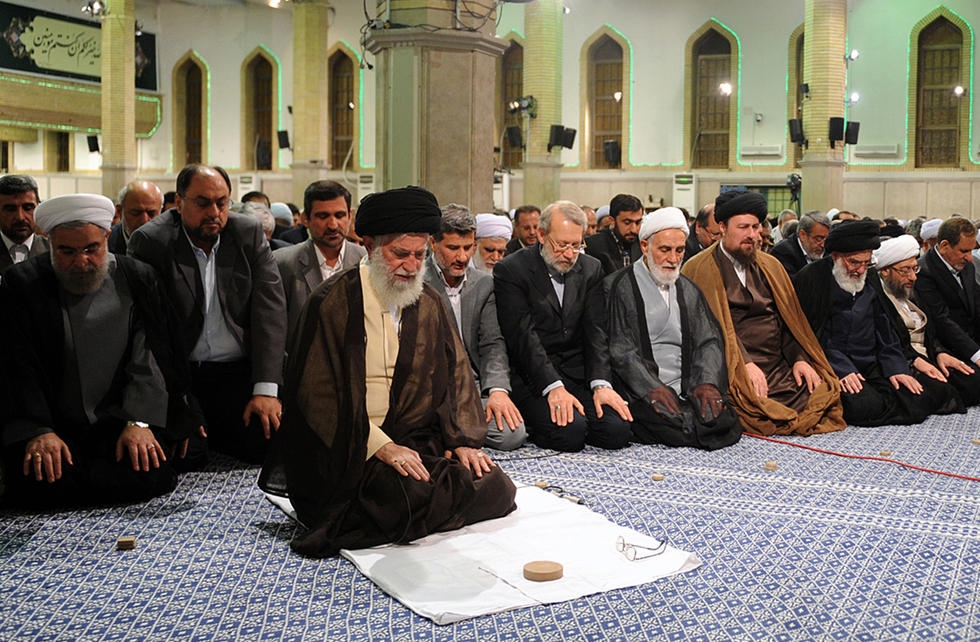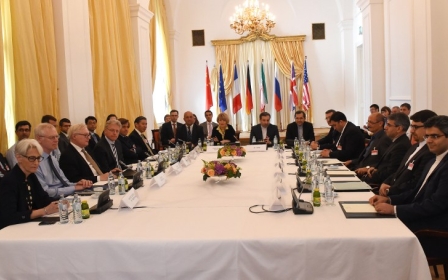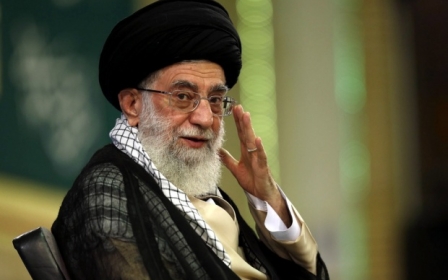Iran's Khamenei asserts authority over nuclear talks

As the deadline of 30 June comes into sharp relief all the players in the complex negotiations on the future of Iran’s nuclear programme are jockeying for position with a view to securing their bottom lines.
While the negotiations between Iranian diplomats and their counterparts from the P5+1 countries are tortuous enough, the domestic political fault lines in the two countries at the centre of the negotiations (Iran and USA) is arguably sharper and more acrimonious.
This is particularly the case in Iran where the months following the interim agreement in early April have been marked by intense factional and partisan bickering.
Hitherto Iran’s leader Ayatollah Seyed Ali Khamenei had stayed outside the dispute, effectively allowing the factions and lobby groups to fight it out.
But in a carefully plotted move the Iranian leader entered the fray earlier this week by setting out clear objectives for the Iranian negotiating team in Vienna, namely the immediate lifting of banking and broader financial sanctions in the event of a deal.
Khamenei’s intervention is primarily designed to bolster the morale and fighting spirit of Iran’s nuclear negotiating team and should not be viewed in the context of the bitter political and ideological disputes in Tehran.
As with other critical national security issues of the past quarter century, the Iranian leader is marshalling his subordinates to serve what he believes to be the national interest.
Factional strife
The formulation and implementation of foreign policy in the Islamic Republic of Iran is excessively influenced by the domestic context in Tehran. For 30 years, until June 2009, this context was defined by a finely tuned and highly sophisticated factional system which operated in the absence of disciplined political parties.
Often described in the domestic and international press as conservatives, reformists and principalists or sometimes reduced to basic terms like “hardliners” or “moderates,” these factions formed and fragmented according to shifting political and ideological priorities.
While some established conservative and reformist bodies have emerged, nevertheless they lack the organisational discipline and sense of mission of conventional political groups. Yet despite this deficiency these factions reformulated and repackaged – sometimes beyond recognition – policies drawn up by dedicated expert bodies such as the foreign and intelligence ministries.
This peculiar Iranian system worked relatively well until the disputed presidential elections of June 2009 and the subsequent unrest, following which the factional system all but collapsed. With the so-called “reformists” effectively thrown out of the system the Iranian security state stepped in to fill the political vacuum.
The ascendance of the security state ushered a period of unprecedented cohesion and clarity in Iranian foreign policy as the expert bodies faced minimal political interference in their work.
The election of Hassan Rouhani to the presidency in June 2013 marked the beginning of the recovery of the factional system. The nuclear dispute - which the Rouhani government is committed to resolving - has become the focal point for factional contention and organisation.
Most significantly the protracted nuclear negotiations have created deep splits within the conservative camp, with notable conservatives joining forces with hard-line groups last year to form the so-called “Delvapasan” (Worried) camp. The “Delvapasan” are in principle opposed to a deal inasmuch as they view any deal as the basis of a broader understanding between Iran and the West.
In the face of intensifying factional strife, and despite spirited opposition, President Rouhani and his foreign policy team have consistently maintained the momentum and now appear to be bringing the decade-long nuclear dispute to a conclusion.
Rouhani’s stated motive for a deal rests on sound economic arguments, namely the lifting of sanctions which has damaged the Iranian economy and appreciably reduced living standards across Iranian society.
The president’s commitment to a deal – and resulting sanctions relief – has been so intense that his political future rests on durable agreement. Without it Rouhani is likely to become the first Iranian president to fail to win re-election to a second term.
But any deal secured in Vienna has to be sufficiently beneficial (from an Iranian point of view) to survive the intense factional positioning which will inevitably form around the agreement’s implementation. And this is where Ayatollah Khamenei’s intervention is beneficial to Rouhani.
Leadership role
Although a conservative by instinct, Khamenei generally stays above the factional disputes which characterise the Islamic Republic’s political life. Nowhere has this supra-factional approach been more evident than on the nuclear file, where Khamenei has laboured hard to define and pursue the national interest.
In defining the national interest on the nuclear file Khamenei has to consider four core constituencies: the Islamic Revolutionary Guards Corps (IRGC), the Rouhani administration, ideological hardliners, and broader public opinion.
The IRGC is the most important constituency not least because the Revolutionary Guards effectively control Iran’s nuclear establishment. Khamenei is likely to veto any clause in the agreement to which the IRGC are implacably opposed, such as opening military sites to regular inspection or disclosing sensitive historical nuclear-related information.
While the ideological hardliners find common ground with the IRGC, public opinion is broadly aligned with the Rouhani administration inasmuch as the Iranian public prioritises sanctions relief over fully fledged nuclear freedom.
This is an extremely difficult balancing act for Khamenei as he has to reconcile the deep interests and strategic calculus of institutional stakeholders with the hopes and aspirations of the public and the government which they elected two years ago.
By applying constructive pressure on Iranian negotiators Khamenei is extending a helping hand to Rouhani who needs a good deal to secure his power base, indeed his very future, in the Islamic Republic.
But above all Khamenei is asserting his own role as the ultimate arbiter and the most effective player in this highly complex international diplomatic arrangement. Despite all the pressures applied by the world’s greatest powers, ultimately it is Khamenei who will decide whether a historic deal is made in Vienna.
- Mahan Abedin is an analyst of Iranian politics. He is the director of the research group Dysart Consulting.
The views expressed in this article belong to the author and do not necessarily reflect the editorial policy of Middle East Eye.
Photo: A handout photo provided by the office of Iran's supreme leader, Ayatollah Ali Khamenei (C), shows President Hassan Rouhani (L), Iranian Parliament Speaker, Ali Larijani(5R), and top officials attending a mass prayer in Tehran following a meeting in which Khamenei restated his country's red lines for a nuclear deal with world powers on June 23, 2015. (AFP)
New MEE newsletter: Jerusalem Dispatch
Sign up to get the latest insights and analysis on Israel-Palestine, alongside Turkey Unpacked and other MEE newsletters
Middle East Eye delivers independent and unrivalled coverage and analysis of the Middle East, North Africa and beyond. To learn more about republishing this content and the associated fees, please fill out this form. More about MEE can be found here.





